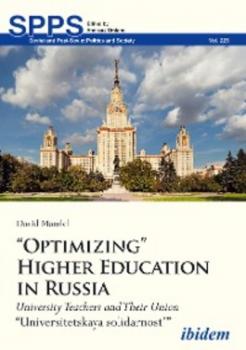David Mandel
Список книг автора David Mandel“Optimizing” Higher Education in Russia
In 2012, soon after his election to a third presidential term as president, following a four-year stint as prime minister (to avoid modifying the constitution), and in the wake of an unprecedented wave of popular protests, Vladimir Putin issued his “May Decrees.” Notable among them was the government’s commitment to increase the salaries of doctors, scientific researchers and university teachers to double the average in their respective regions by 2018. But then on December 30 of that year, the government issued a “road map” for education, revealing that the salary increases in higher education would be paid for, not by significant new government funding, but by “optimization,” which would eliminate 44% of the current teaching positions in higher education. This was justified in part by a forecasted drop in student enrollment.
Thus opened a new, accelerated period of reform of higher education. David Mandel examines the impact of these reforms on the condition of Russia’s university teachers and the collective efforts of some teachers, a small minority, to organize themselves in an independent trade union to defend their professional interests and their vision of higher education.
Apart from the subject’s intrinsic interest, an in-depth examination of this specific aspect of social policy provides valuable insight into the nature of the Russian state as well as into the condition of “civil society,” in particular the popular classes, to which Russian university teachers belong according to their socio-economic situation, if not necessarily their self-image.
Democracy, Plan, and Market: Yakov Kronrod's Political Economy of Socialism
This is the first book in English to present a succinct overview of the influential work of Russian economist Yakov Abramovich Kronrod (1912–1984) on the political economy of socialism. Kronrod headed the theoretical section of the Institute of Economics of the Academy of the USSR in the 1970s until the authorities decided that his ideas were dangerous, banning Kronrod's publications until his death in 1984. Kronrod argued that while national ownership and democracy are the dominant relations of socialism, commodity-market relations nevertheless have an important role to play in the planned economy.
This stunning, revelatory book includes a first translation of one of Kronrod's key essays, 'Socio-oligarchism—Pseudo-Socialism of the Twentieth Century' and introduces Kronrod's thought to the English-speaking world for the first time.

